
If you want to get to grips with missed appointments, you need a cancellation policy. We’ll walk you through the most frequently used types so you can find the best one for your salon.
Missed appointments cost you time and money. Most of all, they cost you patience.
While you can’t entirely prevent late arrivals and last-minute cancellations, you definitely can manage them more effectively. For that, you need a cancellation policy.
Cancellation policies bring clarity into the process of canceling or rescheduling appointments. When you have clearly defined rules in place, the clients know what their options are in case they can’t make it to the treatment as scheduled.
Still, different businesses have different needs, so there are several types of cancellation policies to suit each one.
To help you handle cancellations, we’ve compiled a list of the most commonly used types of those policies. Let’s see what they are.
The least complicated solutions for combating late cancellations are usually the most effective.
This is why you should consider using the most straightforward cancellation policy type; a 24-hour policy.
When you first open a salon, it’s only natural to focus on getting new clients and providing the best service possible. The details about scheduling are of lesser importance at first.
Many salons adjust their practices as they go, and the same principle applies to cancellation policies.
One of such salons is River and Ralph Beauty, where the owner decided to implement a cancellation policy a year after opening.
The owner chose to introduce a 24-hour policy when she noticed a high volume of last-minute cancellations and no-shows.
The rules are simple: she now requests a one-day notice when canceling or rescheduling an appointment.
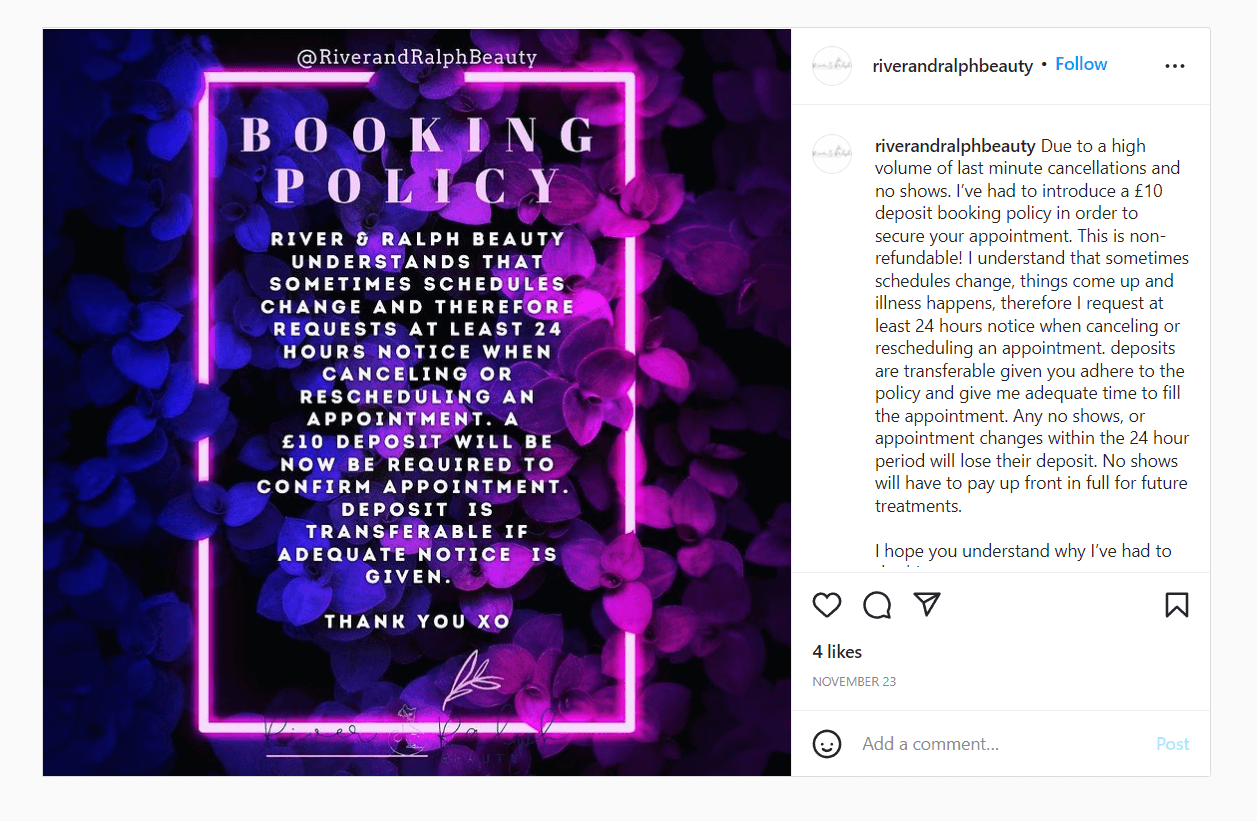
Source: Instagram
As you can see, the owner supplemented the policy with deposits.
She incentivizes the clients to respect the policy by requesting a £10 deposit, which clients can get back if they cancel their appointment on time.
Another noteworthy thing about this policy is that it was straightforward, written in three sentences only.
Remember, the clearer the language you use to describe your policy, the less room there is for misinterpretation.
Lashes by Andrea is another salon that opted for a simple 24-hour policy instead of devising complex cancellation systems.
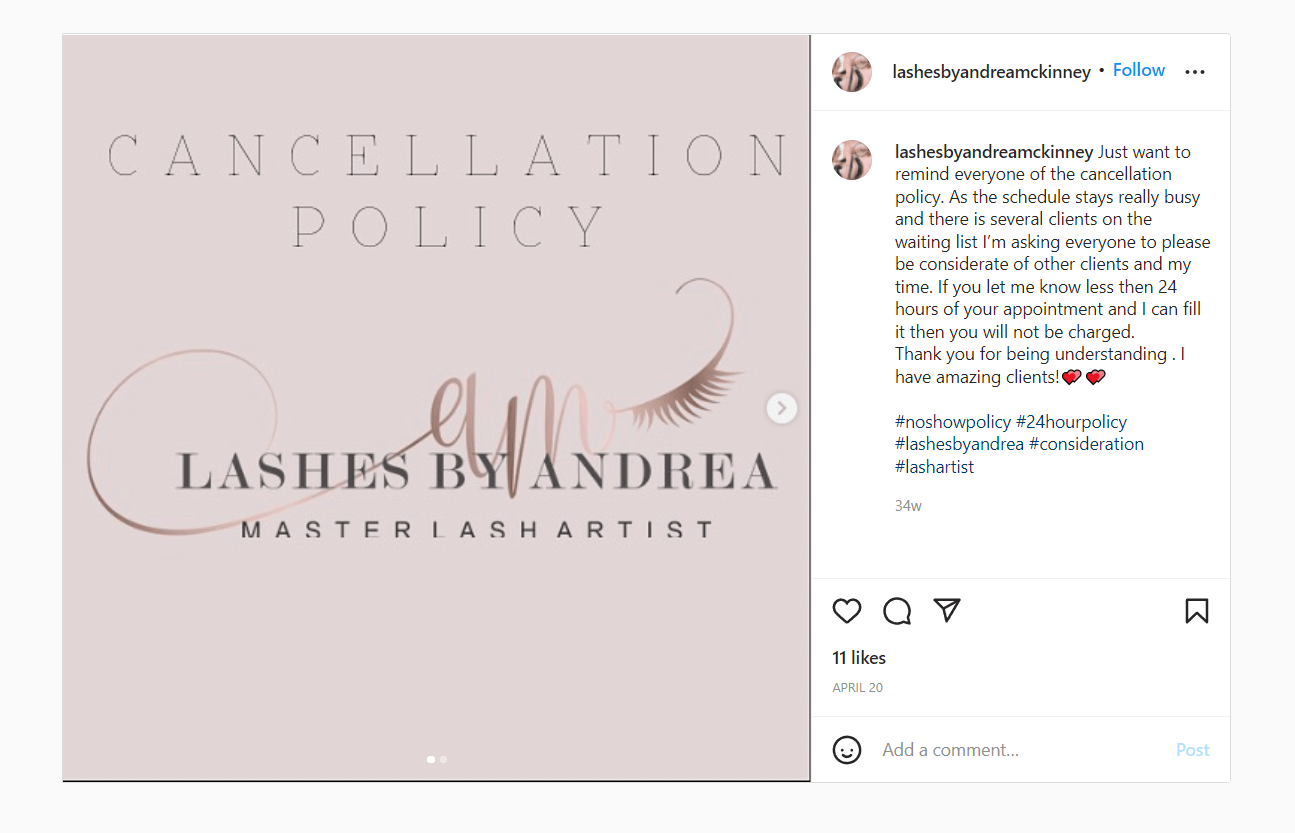
Source: Instagram
Here, the salon owner also explained that the 24-hour cancellation policy allows her to book other clients for the canceled appointment.
Making it clear why you have the policy in place helps your clients understand why it’s important to stick to it.
Of course, what other salons find effective won’t necessarily work for yours.
If you offer more complex services that prevent you from quickly filling the canceled spots, you may want to consider a cancellation policy with more layers to it.
We’re talking about a tiered policy.
Another frequently used salon cancellation policy type is the tiered policy. It allows you to plan for different scenarios so that your staff and income are always protected.
You can consider tiered policies a more advanced form of 24-hour policies. The basic principle stays the same; you just build on it.
Let’s take a look at how Layer Beauty Boutique implemented a three-tier policy.
They give the clients an option to cancel 48 hours before the appointment free of charge, as this leaves the salon with enough time to fill the appointment.
However, if a client cancels less than 24 hours before the appointment, they have to pay 50% of the service charge.
No-shows have to pay the full amount.
You can find the exact wording in the following photo.
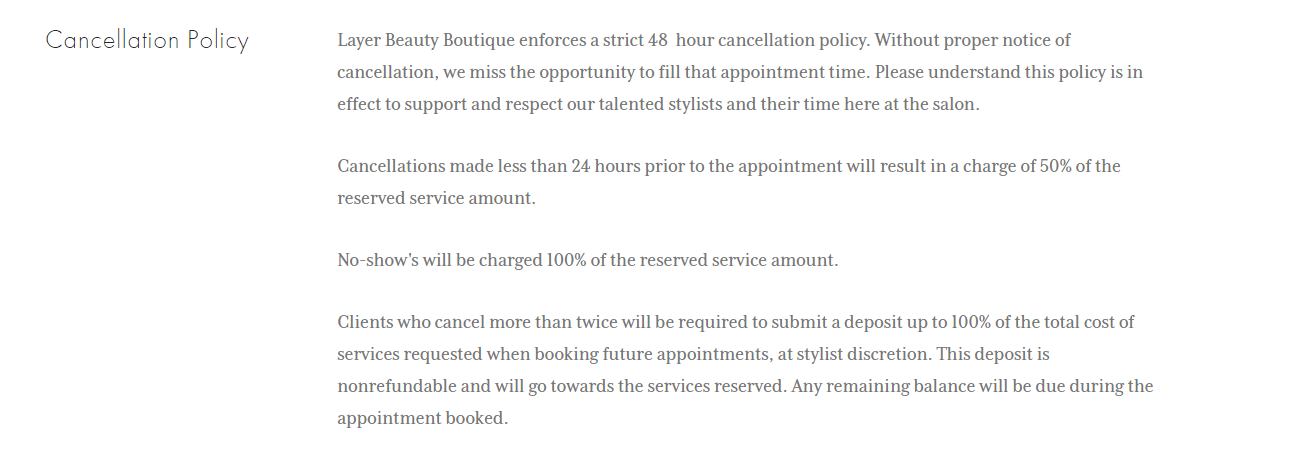
Source: Layer Beauty Boutique
As a salon manager, you know that a business loses money with each no-show or late cancellation, so you have to get creative with how you handle them.
To protect themselves from clients exploiting the 48-hour rule, Layer Beauty Boutique also stated that clients who cancel more than twice have to pay the total price of any future appointments in advance.
In addition to regulating when the cancellations should happen, you can also use a tiered policy to establish the number of allowed cancellations, as Goldiloxx Salon did.
Probably prompted by the indecisive clients who move appointments multiple times, the salon allows regular rescheduling—but only once.
When clients cancel less than 48 hours before the appointment, they pay either 75% or 100% of the service cost, depending on whether they’ve cancelled once or twice before.

Source: Goldiloxx Salon & CryoSkin Spa
As you can see with these two examples, there is no one-size-fits-all way to compose a tiered policy.
Before you write one, it’s helpful to examine the frequency and the type of cancellations in your salon so that you can find the most suitable timeframes.
If you want more tips on writing an effective cancellation policy, you can [check out our guide here](https://zoyya.com/en/partner/blog/salon-cancellation-policy.
If you don’t want your time and expertise taken for granted, your salon should also set a lateness policy, because coming too late can often require salon staff to cancel the client’s appointment.
Arriving on time is something that’s expected.
Yet, most salons occasionally struggle with clients arriving late, which then disrupts their daily schedule and inconveniences other clients.
How many times have you found yourself waiting for a client, getting more and more frustrated as minutes fly by?
Then you hear the shop bell, your client rushes in apologizing, and you realize you’ve only waited for ten minutes.
Even so, ten minutes is more than enough to force you to rush through your service.
Still, turning clients away for being late is quite a drastic measure, especially considering the effort you put into attracting new clients. So what do you do?
Sean Larusso, the owner of Madison Avenue Salon and Day Spa, says that salon managers have to walk a fine line when handling client lateness.
In an interview on salon customer cancellations, Larusso advocates a calm approach.
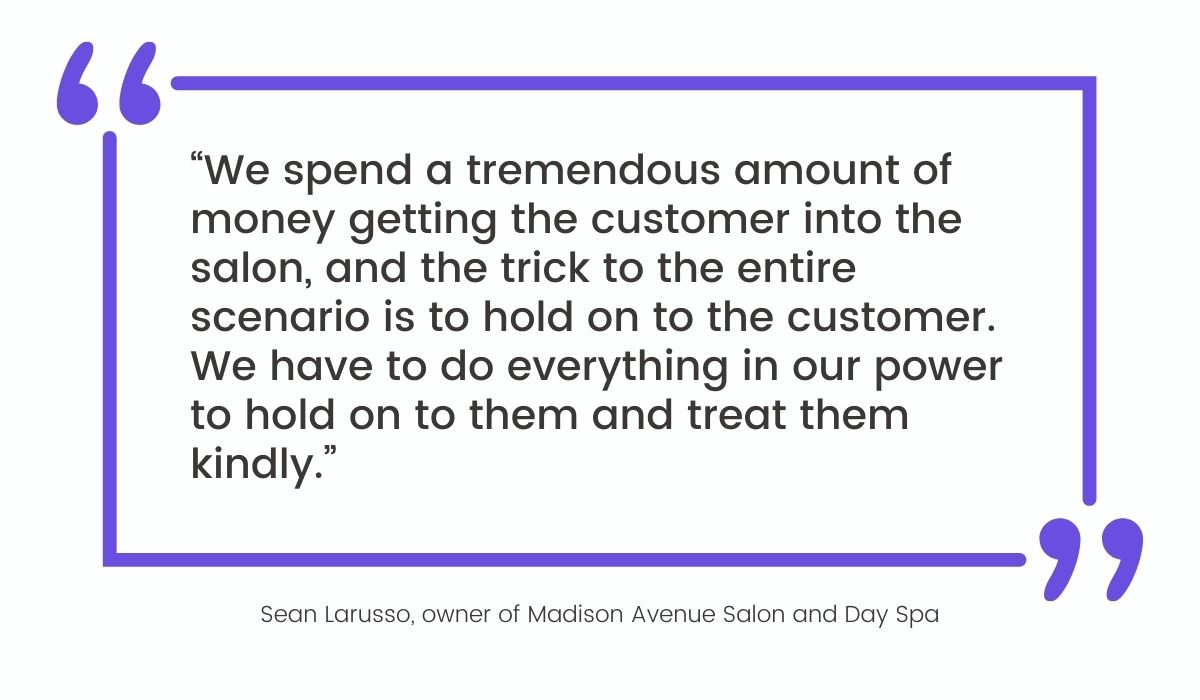
Source: Zoyya
Don’t worry; setting boundaries won’t hurt your client retention. If anything, clearly defining how late is too late will show your professionalism.
For example, Beauty by Lindsay tolerates a 10-minute wait. However, if the client is more than 10 minutes late, that incurs a rescheduling fee.

Source: Instagram
Simply put, people have different understandings of what being late means. Rather than relying on differing social norms on waiting, it would help if you established a lateness policy to clearly state what is acceptable in your salon.
Rigidity will get you nowhere. To make your cancellation policy more effective, you have to know when to bend it a little.
Working with people has probably taught you that life sometimes gets in the way of the best-laid plans.
So, if your otherwise punctual client arrives 15 minutes late for one appointment, rescheduling and charging a fee may do more harm than good to your client relationship.
To nurture great relationships with your clients, it’s a good idea to show some leniency to those with no previous cancellation records.
You will find a client database useful for that.
For instance, Zoyya’s database gives you an overview of all past appointments and any details on cancellations you’ve entered.
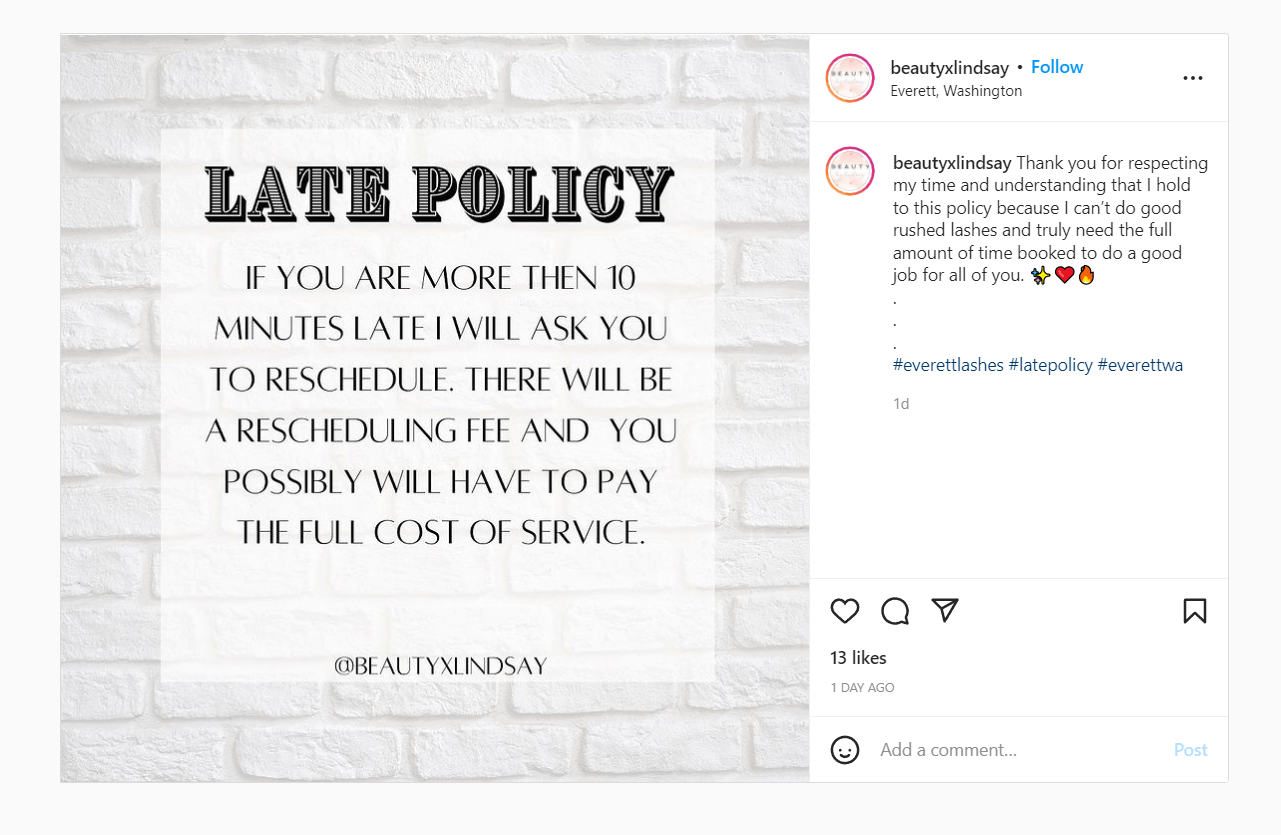
Source: Zoyya
An insight into the client’s history will allow you to base your decisions on facts rather than feelings. This way, your staff can make fair decisions even if you are away.
Similarly, you could write your cancellation policy so that it includes a grace cancellation, as Goldiloxx Salon did.
The salon allows their members one grace appointment a year.

Source: Goldiloxx Salon & CryoSkin Spa
Still, it’s worth emphasizing that grace appointments should be left for emergencies. You should communicate to your clients that they are not a substitute for timely cancellations.
Each salon cancellation policy type will bring structure into your business, but nurturing a relationship with your loyal clients should be your top priority.
If that requires you to bend a rule here and there, so be it—as long as you’re still able to provide excellent service to all other clients.
Regardless of type, to illustrate the usefulness of your cancellation policy, you should show what’s in it for the clients. Make it clear that the policy protects their time as well.
Your salon isn’t the only party that suffers when a client is late. The change in your schedule also makes other clients wait, or maybe even forces you to cut corners in your service.
Therefore, it’s in everyone’s best interest to have a cancellation policy. A clear schedule allows you to dedicate your time to each client completely, which is a crucial element of good customer service.
Since some clients are not aware that their last-minute cancellations affect others, you should politely explain the reasoning behind your policies, as Pure Indulgence did.
This salon decided to preface their policies by describing how they protect the clients.

Source: Pure Indulgence Beauty Therapy
Blondi Salon, on the other hand, dedicated a separate section of the cancellation policy to show how it protects their clients’ time.
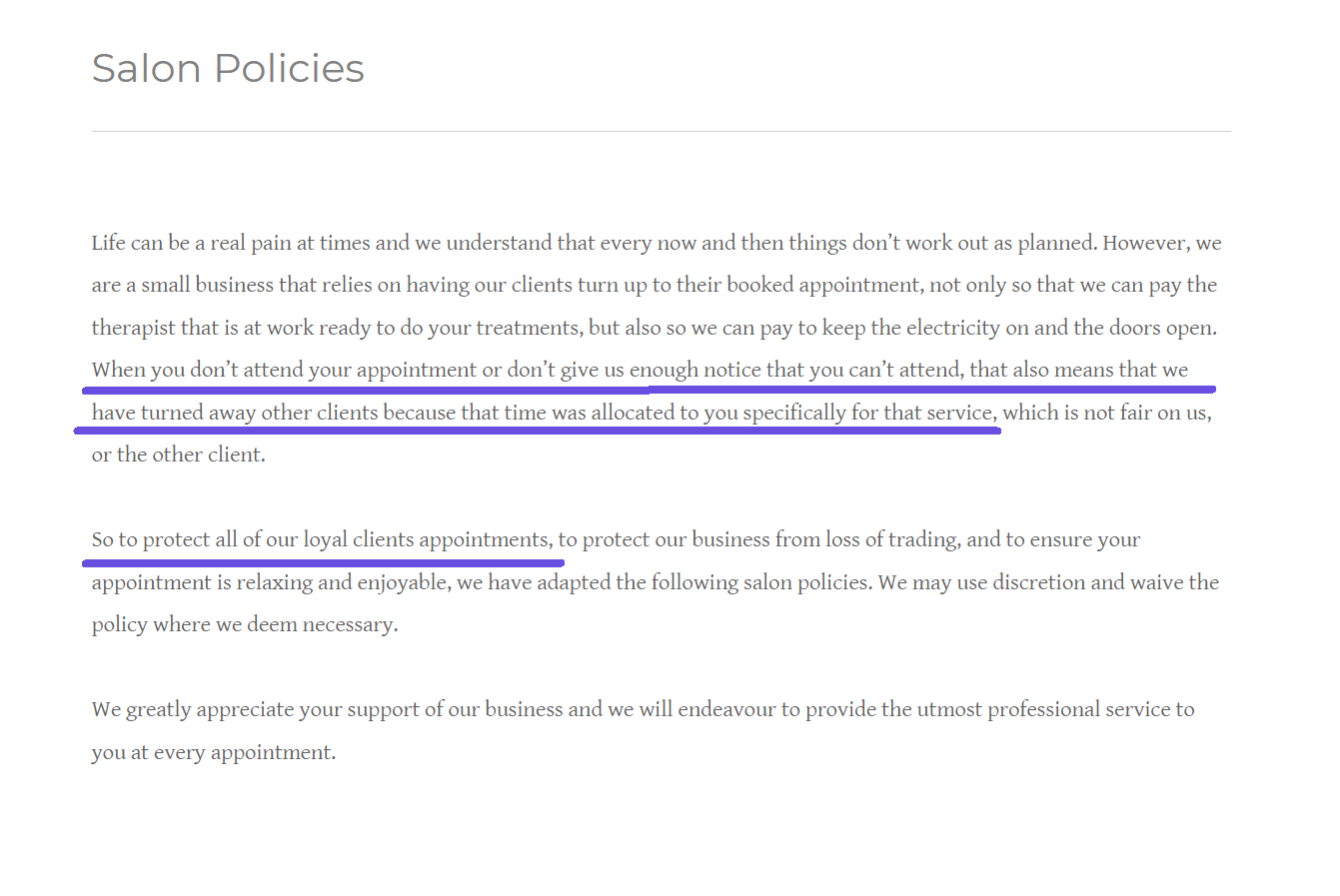
Explaining the rationale behind your policies makes your salon rules more understandable.
And clients will follow a policy much easier if they know how it benefits them.
So, instead of just setting some hard-and-fast rules, try to show your clients that the policies are there to make everybody’s stay in the salon more comfortable.
If you want to reduce last-minute cancellations, your safest option is to introduce a cancellation policy and enforce it consistently.
Depending on the size of your salon and the scope of your services, you can choose between requesting 24 or 48 hours’ notice. Anything less than that makes it difficult to fill in the empty slot.
Don’t forget to emphasize that the cancellation policy isn’t only there to protect the salon. Its purpose is to protect your clients’ time as well.
This is also a good reason to create a lateness policy because nobody wants to receive a rushed treatment because a previous client was late.
Finally, keep in mind that your salon is unique. Feel free to mix and match the elements of these types of policies and tailor them to your needs.
Keep the language clear, and your clients will reschedule their appointments in time.
We never send spam or share your email address.
We use cookies to enhance your browsing experience, serve personalized ads or content, and analyze our traffic. By clicking "Accept", you consent to our use of cookies.Read our cookie policy